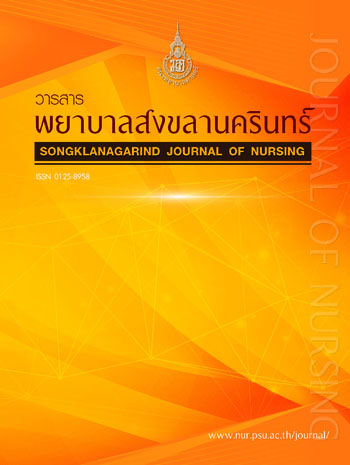The Effects of Exercise-Based Illness-Representation Promoting Program on Exercise Behaviors and Functional Capacity in Patients with Acute Myocardial Infarction After Percutaneous Coronary Intervention
Main Article Content
Abstract
This quasi-experimental research aimed to examine the effect of exercise-based illness-representation
promoting program on exercise behaviors and functional capacity in patients with acute myocardial infarction
after percutaneous coronary intervention at two tertiary hospitals in southern Thailand. Forty patients were
purposively selected and assigned equally into the experimental and the control group. Paticipant in the
control group were cared for routinely while those in the experimental group received the exercise-based
illness-representation promoting program. Instruments used for data collection included (1) the Demographic
and Illness Questionnaire (2) the Illness Perception Open-ended Questionnaire and the Brief Illness
Perception Questionnaire (B-IPQ) and (3) Exercise Behaviors Questionnaire and The Veterans Specific
Activity Questionnaire (VSAQ). The test-retest reliability of the B-IPQ and the VSAQ was 0.95 and 0.80,
respectively. The internal consistency reliability of the Exercise Behaviors Questionnaire was tested and
yielded a Cronbach’s alpha coefficient of .92. Demographic data and illness information were analyzed using
descriptive statistics and chi-square. Hypotheses were tested by using Independent t-test and Paired t-test.
The results revealed that:
1. The mean score of exercise behaviors in the experimental group after receiving exercise-based
illness-representation promoting program was statistically significantly higher than that of the control group
(p < 0.05). However, the mean score of functional capacity revealed no statistically significant difference
(p > 0.05).
2. The mean score of exercise behaviors and functional capacity in the experimental group
after receiving exercise-based illness-representation promoting program was statistically significantly higher
than that before receiving the program (p < .05).
The results of this study indicate that nurse should implement this Exercise-Based Illnessrepresentation
Promoting Program in their practice in order to promote exercise behaviors in patients with
myocardial infarction after percutaneous coronary intervention.


